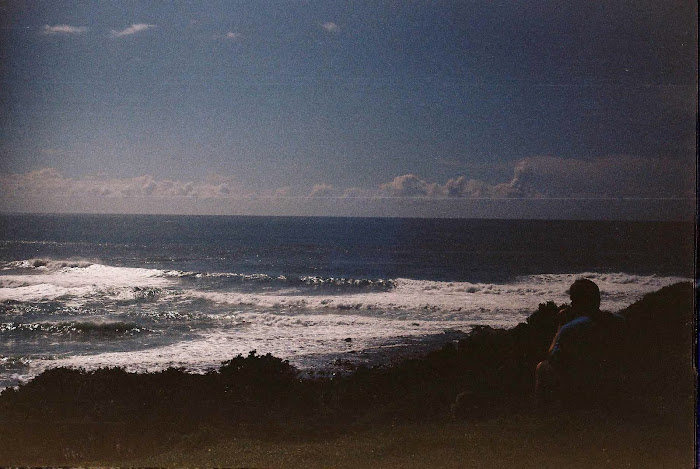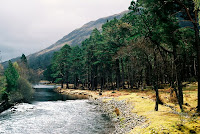A while ago I snapped my knee. It was in the surf but was in no way heroic. A mistimed floater on a two-foot closeout at Jongens, head over heels and the leg stayed put. A snapped PCL, torn MCL, stretched ACL, a torn medial meniscus and a headache. From Jongens it was a long and painful drive back to Cape Town in the back of a rusted Tazz with blown speakers and no aircon. At sport’s science I was told to forget surfing for the forseasble future and think about surgery instead. And with that, I passed out. Stone cold, like a coward running from reality. When I came to, weak as a newborn child in a thick cold sweat, I realized this was all very real. My next thought was of the new suit I’d just ordered for summer. Bummer.

The operation came and went and I was soon strapped into a full leg cast rendering me more incapacitated than I’d initially expected. Any lingering thoughts of surf were quickly banished as my main challenge became getting out of the house in one piece. My day became littered with the most innocuous of obstacles: Showers, stairs, lavatories, raised curbs and street hawkers who heard me coming a mile off and knew I could not escape. Life, in short, changed.
And the surf, as it always does in those situations, pumped. From my bedroom window I watched the reef fire for two weeks straight. One day it got huge and they were riding big boards through the barrels on the right whilst the spongers were the only ones to tackle the main bowl. Then came the most consistent summer in years, with the Cape copping it’s fair share of media exposure as session after session from ‘down the beach’ plastered the surf sites from which I eventually had to abstain. It was too much. I was in surfing purgertory, and for what? I thought i’d done ok.

So slowly I withdrew from the surf scene. I stopped checking the forecasts, stopped reading the mags, stopped ogling the reef from my window each morning and prepared to tackle life from a new, surfless perspective. I read, I wrote, I researched and planned. I spent weeks tying all the loose ends I’d never attended to and built stronger and firmer relationships with my friends in the charity I run in the Cape townships. I got to grips with the manual settings on my camera, I found an old 8mm and messed around with that, anything to keep my mind busy and off my rapidly atrophying muscles.
When the day came for the cast to come off, I took my first steps under the watchful eye of Bruce the masochist, and I learnt to walk again. It was humbling, time consuming and it provided much amusement to the innocent observer. Life, more than at any other time in my memory, reverted to a study of the minutiae, the building blocks. Walking, twisting, bending; every action took time and consideration and it was a journey full of mishaps and immense satisfaction as the simplest of progressions bought huge relief and reward. I learned a lot.
By March the swells had by in large past and the South East set in to blow the Atlantic flat and False Bay a brown, scummy maelstrom. For all that had passed it seemed fitting that I should come right again, in the death rattle. My first go out was at a glassy but hungover and ramshackle ‘berg, suffering after a 10 day South East binge. I was weak, as were the waves, and I cut a forlorn figure dragging myself to my feet on a big yellow rental, but I was surfing again, performance did not matter; I drew relief from a pure line, joy from simple trim or a lazy glide, the simple things.
As my strength returned, so my desire to surf increased and I took to the waves with renewed vigour, but with a changed outlook. Conditioned somewhat by my still weakened condition I began riding a single fin that had long been resigned to the back of my quiver. A little bulkier than my other boards it was more forgiving and didn’t need to be worked like a thruster. The ride was pure; one fin, two rails. Once more I found myself returning to the basics, learning to walk; trim, positioning, glide and flow. No heroics, no histrionics, just enjoying the ride for what it was, the pure and unbridled joy of being on a wave. No need to get ahead of myself or overcomplicate, just cruising and enjoying what I had. Simplicity, and it felt right. It felt good.

Out of the water things too had changed. I had become reliable for the first time in years, and with this most simple of virtues I had gained the trust and friendship of my coworkers and friends. Work in the townships picked up a pace and the charity developed dramatically over the course of the four months with new staff, projects, legal structures and funding all coming in. I found new leads for writing and publishing, I started a website, a blog for my photos. I even contemplated my first book, but never quite put pen to paper. And I was satisfied, maybe more so than I had been when I pushed it just a little too far.
My housemate insists this injury was the best thing to have happened to me. My dear housemate is also Irish and gambles for a living but, though I am loathe to admit it, he has a point. Time away brings with it perspective and, though the barren months dragged by, the absence of surf allowed other aspects of life to secure a footing and bloom.
Surfing and the ocean are still very important, once they were everything and they still remain close to it. I missed the ocean, I know that much! But life is better in 3D, it’s so easy to get bogged down. Today surfing fits in rather than taking over and I appreciate the time in the water more for it; just cruising, enjoying the ride and trying not to force it; a simple trim, a pure line rather than breaking my back to break an arc.
Sometimes it takes a nock to bring you round, a break to rediscover, to usher in a new perspective. It’s not always pleasant, but it can be constructive to slow down once in a while and focus on the simple things.










































